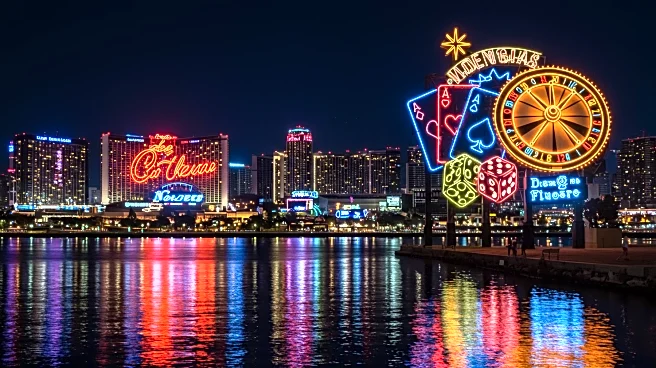What's Happening?
The Las Vegas Convention and Visitors Authority (LVCVA) has attributed a decline in tourism to tariffs imposed during President Trump's administration. According to LVCVA President Steve Hill, these tariffs have negatively impacted international relations, leading to a significant drop in visitors, particularly from Canada, which is Las Vegas's largest international market. The city has seen a decrease in tourism numbers, with only 3.1 million visitors in June, marking an 11.3% decline from the previous year. This downturn has affected the hotel industry, with occupancy rates dropping by 6.5% and average daily room rates decreasing by 6.6%. Despite these claims, some argue that the decline is due to self-inflicted issues such as high prices and additional fees imposed by casinos and hotels.
Why It's Important?
The decline in Las Vegas tourism has broader implications for the city's economy, which heavily relies on the hospitality and entertainment sectors. A continued decrease in visitors could lead to further economic challenges, including job losses and reduced revenue for local businesses. The situation highlights the potential impact of international trade policies on local economies, as well as the importance of competitive pricing and value in attracting tourists. The debate over the causes of the decline also reflects broader discussions about the effects of tariffs and economic policies on different sectors.
What's Next?
Las Vegas may need to reassess its pricing strategies and value propositions to attract more visitors. The city could also explore new marketing strategies to appeal to younger generations who prefer online gambling and different entertainment options. Additionally, there may be discussions among policymakers and business leaders about how to mitigate the impact of tariffs and improve international relations to boost tourism.
Beyond the Headlines
The situation in Las Vegas raises questions about the sustainability of its current business model, which has increasingly relied on high fees and charges. There is also a cultural shift as younger generations seek different experiences, potentially signaling a need for the city to innovate and adapt to changing consumer preferences. The role of online gambling as a competitor to traditional casinos is another factor that could influence the future of Las Vegas tourism.









